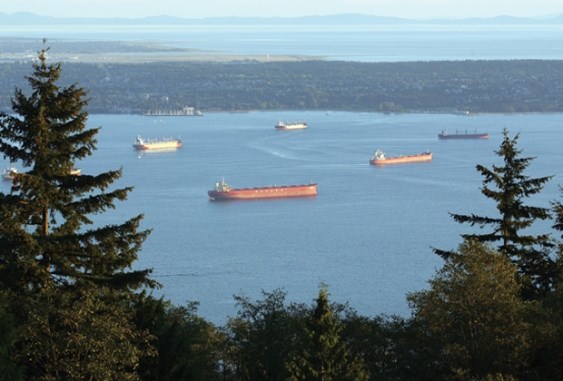Final arguments have begun for local governments, First Nations and environmentalists into Kinder Morgan’s proposal for a new pipeline from Alberta to the Burrard Inlet.
The National Energy Board, which must eventually recommend approval or rejection of the Trans Mountain pipeline, has been holding hearings for groups granted intervenor status in Burnaby this week.
The Squamish Nation led its final arguments on Thursday, stressing that the Trans Mountain proposal posed a direct threat to the nation’s traditional way of life, which is still practised and tied critically to the surrounding environment.
“From a Squamish world view, you cannot separate cultural and spiritual values from the lands and waters. From the Squamish perspective, you can’t just count the fish in an area and call that a value to be assessed and determine whether the effect is adverse or not by the number of fish that may be killed by the project,” said Aaron Bruce, a Squamish Nation lawyer. “Only Squamish can truly understand it. We want to have that conversation with the Crown and industry so we can protect these values in the best way possible. It’s our sacred duty as Squamish to protect these values for future generations.”
The Squamish Nation was never consulted about those values prior to the review process being drawn up, Bruce said. The proposal to triple the amount of diluted bitumen being shipped via Burrard Inlet also unrealistically minimized the risks of a catastrophe, Bruce said, and did not focus on the impacts.
In its presentation on Friday morning, the District of West Vancouver urged NEB to reject Kinder Morgan’s pipeline expansion plan, saying increased tanker traffic in Burrard Inlet would mean increased risks, costs and environmental damage to the municipality without benefit.
Municipal lawyer Maegan Giltrow told the panel the way authorities dealt with the relatively small-scale oil spill from the Marathassa in April 2015 gave the municipality no confidence cleanup of an oil spill would be properly handled.
It was not until almost 22 hours after the spill was initially detected that the Coast Guard provided information to the municipality on the extent of the spill, said Giltrow. By that time, she said, “the spill was 500 metres from the shore of West Vancouver.”
Federal authorities in charge of the cleanup only agreed to make sure globules of oil were removed from the beach after the municipality insisted, said Giltrow. West Vancouver beaches weren’t reopened by local health authorities until three weeks after the command centre in charge of the spill cleanup had already been shut down, she said. Giltrow said with the seven-fold increase in tanker traffic expected if the pipeline is approved, “the evidence is the risk will go up.”
West Vancouver is also concerned about the potential impact of increased noise, light and air pollution from tanker traffic that will pass by the municipality and anchor in front of its shores.
Environment Canada has concluded the pipeline proposal has significantly underestimated the level of particulate and nitrous oxide that would be released into the air if the pipeline expansion goes ahead, according to Giltrow.
The City of North Vancouver will deliver its final arguments against the project on Monday morning; Tsleil-Waututh Nation and the District of North Vancouver are scheduled for Tuesday; North Shore NO Pipeline Expansion for Wednesday.



